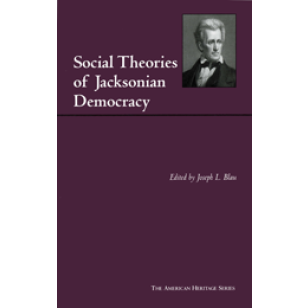Social Theories of Jacksonian Democracy
"This bracing collection offers a profound glimpse into the depth and variety of social views Jackson and Van Buren had to negotiate in order to create the now familiar sort of political party that has been essential to American democracy. Composed of entirely primary sources, the collection remains a revealing window into the social and political thought of the Jacksonian America, and stands as an essential complement to contemporary secondary treatments of the era."
—Russell Muirhead, Harvard University
A reprint of the 1954 Bobbs-Merrill edition.
History’s first national party with roots in a mass electorate, the Jacksonian Democrats were not so much unified around a shared policy program as they were a patchwork of conflicting interests. They came together most vigorously in the name of what they opposed: the emerging financial and commercial monopolies, the old Washington dynasty, and any whiff of privilege or aristocracy. Yet they demonstrated how even unprincipled national parties could invigorate representative democracy and repair the growing rifts between Northern industrialists, the Old South, and the developing West.
These texts show the Jacksonian movement as a cross-section of nineteenth century America. A picture of popular democracy in its infancy, they together form a study of unity in diversity.
Reviews:
"This bracing collection offers a profound glimpse into the depth and variety of social views Jackson and Van Buren had to negotiate in order to create the now familiar sort of political party that has been essential to American democracy. Composed of entirely primary sources, the collection remains a revealing window into the social and political thought of the Jacksonian America, and stands as an essential complement to contemporary secondary treatments of the era."
—Russell Muirhead, Harvard University
Contents:
Preface. Bibliographical Note. Introduction: Jacksonian Social Thought.
PART ONE: The Idea of Self-Government
1. Andrew Jackson: A Political Testament
2. Democratic Review: An Introductory Statement of the Democratic Principle
3. Charles Stewart Daveis: Popular Government
4. James Fenimore Cooper: On Representation
5. William Emmons: Democratic Republicanism
6. William Leggett: Democratic Editorials
7. Martin Van Buren: Political Opinions
8. Benjamin F. Hallett: The Sovereignty of the People
9. Walt Whitman: Reflection on Democracy
PART TWO: Economic Themes
10. Stephen Simpson: Political Economy and the Workers
11. David Henshaw: The Dartmouth College Case
12. William M. Gouge: Principles and Effects of the Banking System
13. Theophilus Fisk: Capital against Labor
14. William Cullen Bryant: On Usury Laws
15. John W. Vethake: The Doctrine of Anti-Monopoly
16. Theodore Sedgwick, Jr.: What is a Monopoly?
17. Gilbert Vale: Political Economy
PART THREE: Social Criticism
18. George Bancroft: The Office of the People
19. Richard M. Johnson: Sunday Observance and the Mail
20. Frances Wright: On Existing Evils and their Remedy
21. Ely Moore: On Labor Unions
22. Orestes A. Brownson: The Laboring Classes
23. Frederick Robinson: A Program for Labor
24. Langdon Byllesby: Proposed Remedies for Unequal Wealth
25. Thomas Skidmore: A Plan for Equalizing Property
26. Richard Hildreth: Hopes and Hints as to the Future
Biographical Notes. Index.
About the Author:
Joseph L. Blau was Professor of Religion, Columbia University.







